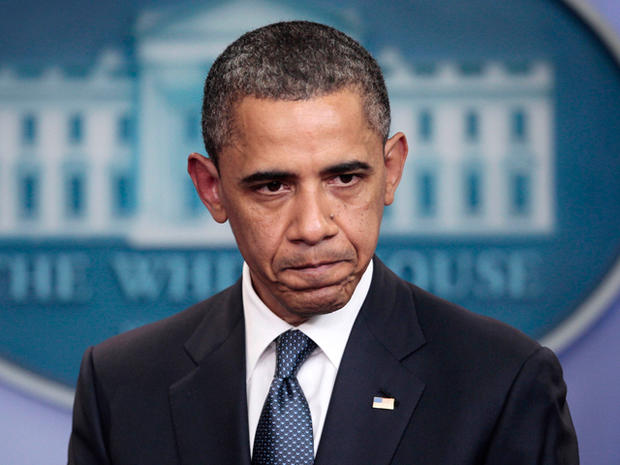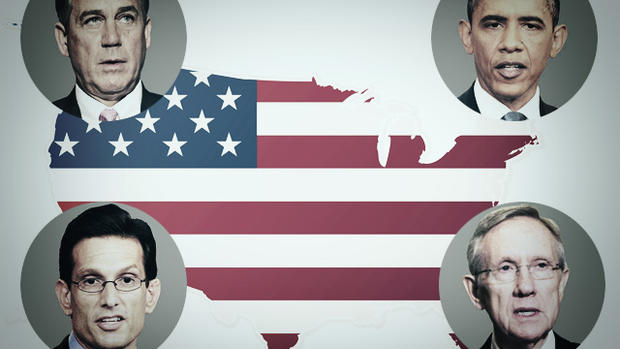Debt talks: Could the "grand bargain" come back?
This post originally appeared on Slate.
President Obama has tried to guilt, shame, and cajole House Republicans into a more flexible position on raising the debt limit. Lately his public statements have contained new pieces of evidence aimed to show House Republicans how isolated they are. Last week he mentioned the polls: Americans and a majority of Republicans support Obama's view that a final deal must include a mix of spending reductions and revenues from changes in the tax code. Yesterday, he took to the White House briefing room to herald a late-breaking bipartisan deficit-reduction agreement among six senators: "We now have a bipartisan group of senators who agree with that balanced approach." Tomorrow he may pick people out of the White House visitor's line: Mary Jones of Knoxville was just saying how much she wants us to put politics aside. ... And over here, Girl Scout Troop No. 32 supports a balanced approach!
CBS News Poll: 2/3 back tax hikes in debt deal
CBS News Poll: Support for debt ceiling increase doubles
Can the president use the gravitational force of the center to lure Republicans his way? Probably not. But he may benefit from disagreement between Senate Republicans and their more hard-line colleagues in the House, where the only thing worse than raising government revenue is cutting spending too little.
Last week the attempt to put together a "grand bargain" that included trillions in spending cuts and about a trillion in new revenue looked doomed. Senior Republican aides in the Senate were declaring the White House talks irrelevant. Time had run out, and the only way to avoid an economic catastrophe was a "failsafe" deal being put together by Senate Minority Leader Mitch McConnell and Majority Leader Harry Reid. The proposal would raise the debt limit, but include no spending cuts. There would be a committee of senators to propose reductions Congress could vote on.
Obama's preferred strategy: Go Big
House Republicans balked. For a brief moment there was hope that some could be bought off by including some spending cuts in the failsafe plan. But as White House and Hill negotiators talked about those cuts they ran into a problem: Nothing would satisfy conservatives. The cuts either wouldn't be substantial enough, or they would be made up of savings on interest, revenue from asset sales, and other measures that wouldn't actually curb the size of government. Plus, some spending reductions would be in areas like agriculture, cuts that Republicans find hardest to swallow. Tuesday, 60 House Republicans delivered a letter to Speaker John Boehner asking that the McConnell plan not even be brought up for a vote.
So now that McConnell's face-saving deal looks as hard to get as the big deal, the big deal is back in play (at least for this sliver of the news cycle). All along the president has been saying that since a small deal was just as hard as a big one, why not go for the big one and at least get the credit? Yes, such a deal would require some kind of creative tax solution that would appeal to the president's desire for balance. But it would also allow fiscal hawks to point to a big amount of savings as well as cuts in entitlement spending, which they have long sought.
Gang of Six plan gets boost in House
Tea Party threatens GOP over debt deal
CBSNews.com special report: America's debt battle
Whether the minds of House conservatives can be changed requires Congress first dispensing with the "Cut, Cap and Balance Act." It is the most austere of the budget-reduction measures that would cut discretionary spending, limit future growth, and begin the process of passing a balanced budget amendment. It will fail in the Senate--and only after it does, say House Republican aides, can leaders begin anew the talk about what legislation can actually pass. Recalcitrant members can tell their constituents that they fought for the most severe measures, but when it failed they took the biggest deal they could get.
Will that deal suddenly emerge around the new Gang of Six plan in the Senate? Though the president said he supported it, he also said he hadn't studied its details. His spokesman then held a briefing in which he repeatedly said White House aides hadn't had a chance to look at it.
There was another reason to stay vague. If the president puts his fingerprints on specifics in public it will sour the chance for negotiators to work out the terms of a deal in private. Though Republicans have been clamoring for the president to release details of his plan for reducing the government in public, all parties know that this vagueness gives everyone maximum flexibility in the negotiating room. Boehner's spokesman pointed out the deal resembled the one Boehner had been working on with Obama before negotiations fell apart with a mix of entitlement reductions and tax reform. Majority Leader Eric Cantor issued a press release saying vague but positive things about it. In a process where proposals have been rejected out of hand, these were positive signs to deal-makers.
There are so many tracks now in the debt-limit talks we may need a national conductor. White House and House GOP sources say both sides are still trying to find a grand bargain. McConnell and Reid continue to work on their plan despite Tea Party roars. The Senate's Gang of Six is trying to figure out whether its plan has any actual support, and if so, if its provisions could be put into legislative language. The "Cut, Cap and Balance" pantomime continues.
Meanwhile we're 14 days away from the Aug. 2 deadline for default. If anyone else has a deal out there, bring it forward. Surely we're going to move to the winnowing stage soon.
More from Slate:
Rupert Murdoch, James Murdoch, and Rebekah Brooks pretend they're the ultimate phone-hacking victims
Government default: What would it look like?
Can Van Jones help liberals create their own version of the Tea Party?


